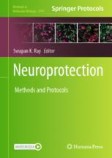Search
Search Results
-
Vitexin Improves Cerebral ischemia‑reperfusion Injury by Attenuating Oxidative Injury and Ferroptosis via Keap1/Nrf2/HO-1signaling
Cerebral ischemia/reperfusion involves multiple pathological processes and ferroptosis played a crucial role in the disease progression....

-
HH-A, a modified honokiol, protects against cerebral ischemia/reperfusion induced brain injury in rodent via Nrf2/HO-1 signaling pathways
Honokiol, a bioactive component found in Magnolia officinalis , has shown in protecting against ischemic stroke in animal models. However, its poor...

-
Dose-Dependent Effects of Intravenous Mesenchymal Stem Cell Transplantation in Rats with Acute Focal Cerebral Ischemia
Intravenous transplantation of mesenchymal stem (stromal) cells (MSC) is a promising approach to the treatment of ischemic stroke. In the published...
-
Melatonin Offers Dual-Phase Protection to Brain Vessel Endothelial Cells in Prolonged Cerebral Ischemia-Recanalization Through Ameliorating ER Stress and Resolving Refractory Stress Granule
Ischemic-reperfusion injury limits the time window of recanalization therapy in cerebral acute ischemic stroke (AIS). Brain vessel endothelial cells...

-
TRIM45 causes neuronal damage by aggravating microglia-mediated neuroinflammation upon cerebral ischemia and reperfusion injury
Excessive and unresolved neuroinflammation is a key component of the pathological cascade in brain injuries such as ischemic stroke. Tripartite...

-
Propofol Inhibits Ferroptotic Cell Death Through the Nrf2/Gpx4 Signaling Pathway in the Mouse Model of Cerebral Ischemia–Reperfusion Injury
Ferroptosis is characterized by excessive accumulation of iron and lipid peroxides, which are involved in ischemia, reperfusion-induced organ injury,...

-
The Role of Necroptosis in Cerebral Ischemic Stroke
Cerebral ischemia, also known as ischemic stroke, accounts for nearly 85% of all strokes and is the leading cause of disability worldwide. Due to...

-
The Effect and Mechanism of Syringa pinnatifolia Hemsl. Ligans on Cerebral Ischemia-Reperfusion Injury and Oxidative Stress in Mice
Lignans are the main components of Syringa pinnatifolia Hemsl . (SP). Previous studies have shown that SP lignans (SPL) can considerably improve CCl 4 -i...

-
MiR-10b-3p alleviates cerebral ischemia/reperfusion injury by targeting Krüppel-like factor 5 (KLF5)
Although miR-10b-3p has been identified to be involved in cerebral ischemia injury, its impact and specific mechanism in cerebral ischemia injury...

-
Neuroprotective Effects of \(\varvec\gamma\)-Terpinene in Rats with Acute Cerebral Ischemia: Modulation of Inflammation, Apoptosis, and Oxidation
The study aimed to assess 𝛾-Terpinene’s (𝛾-TER) neuroprotective potential in acute cerebral ischemia, characterized by reduced cerebral blood flow...

-
Zinc Accumulation Aggravates Cerebral Ischemia/Reperfusion Injury Through Inducing Endoplasmic Reticulum Stress
Zinc is highly enriched in the central nervous system. Numerous evidences suggest that high concentration of zinc acts as a critical mediator of...

-
RXRγ attenuates cerebral ischemia–reperfusion induced ferroptosis in neurons in mice through transcriptionally promoting the expression of GPX4
Cerebral ischemia is a common cerebrovascular disease with high mortality and disability rate. Exploring its mechanism is essential for develo**...

-
The lncRNA NEAT1 Mediates Neuronal Cell Autophagy and Related Protein Expression After Cerebral Ischemia‒Reperfusion Injury
The present study focuses on the role of the long noncoding RNA (lncRNA) NEAT1 in regulating autophagy during the ischemia‒reperfusion (I/R) injury...

-
Remote ischemic preconditioning protects against cerebral ischemia injury in rats by upregulating miR-204-5p and activating the PINK1/Parkin signaling pathway
Remote ischemic preconditioning (RiPC) is the process where preconditioning ischemia protects the organs against the subsequent index ischemia. RiPC...

-
Nanotechnology: A Daydream for Advanced Imaging, Diagnosis, and Therapeutic Approach for Cerebral Ischemia
Cerebral ischemia is one of the many deadly disorders that is caused due to the blocking of blood vasculatures in the brain and causing oxygen...
-
Nicotinamide Mononucleotide Adenylyltransferase 1 Regulates Cerebral Ischemia–Induced Blood–Brain Barrier Disruption Through NAD+/SIRT1 Signaling Pathway
The molecular mechanisms of blood–brain barrier (BBB) disruption in the early stage after ischemic stroke are poorly understood. In the present...

-
Astrocyte-Derived TNF-α-Activated Platelets Promote Cerebral Ischemia/Reperfusion Injury by Regulating the RIP1/RIP3/AKT Signaling Pathway
Ischemic stroke is a clinical syndrome caused by the disruption of blood flow into cerebral tissues and is associated with high disability and...

-
The Two-Pore Domain Potassium Channel TREK-1 Promotes Blood–Brain Barrier Breakdown and Exacerbates Neuronal Death After Focal Cerebral Ischemia in Mice
Earlier studies have shown the neuroprotective role of TWIK-related K + channel 1 (TREK-1) in global cerebral and spinal cord ischemia, while its...

-
Age-Associated Resilience Against Ischemic Injury in Mice Exposed to Transient Middle Cerebral Artery Occlusion
Ischemic stroke is the leading cause of death and disability. Although stroke mainly affects aged individuals, animal research is mostly one on young...

-
Rat Model of Middle Cerebral Artery Occlusion
Stroke is the third-leading cause of death and the leading cause of acquired adult disability worldwide. Several ischemic stroke models are currently...
